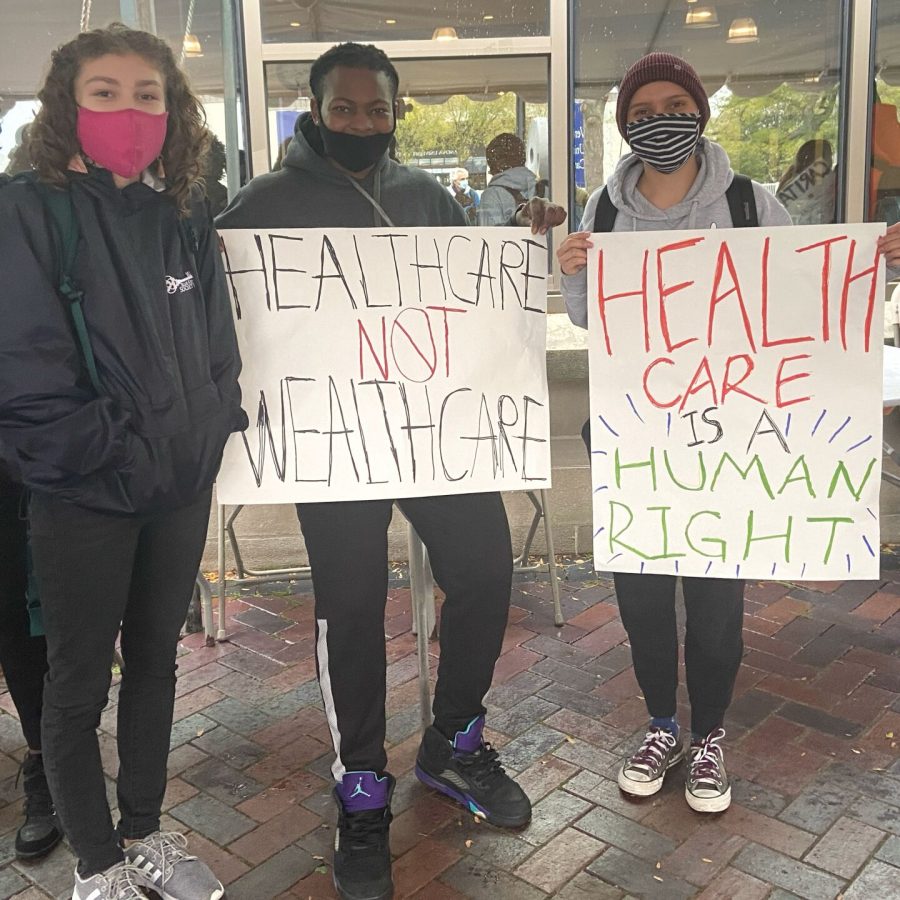Doctoral Student Council Hosts Rally for Healthcare
Students at the protest held signs to support the cause.
November 3, 2021
Should Villanova and other universities subsidize healthcare coverage for graduate students and assistants? On Oct. 29, graduate students, faculty, staff and members of the community gathered at the Oreo for a rally to raise awareness about their initiative for Villanova-sponsored healthcare. Organized by the Doctoral Student Council, the rally began at 3:30 p.m. with a march around campus and concluded with speeches from Fr. Art Purcaro, Andre Prince and several graduate students reading their own or anonymously submitted testimonials.
The Doctoral Student Council has been advocating for healthcare support from the University for students “financially dependent on the university,” specifically graduate students and adjuncts. They’ve increased their efforts since the start of the COVID-19 pandemic, as their experiences have served as a frightening reminder of the danger of inadequate healthcare coverage as the students work in labs or teach in classrooms.
Jen Wang, Philosophy Co-Chair and event coordinator, provided valuable insight regarding this issue through a recent Anti-Poverty Symposium.
“Funded doctoral students make about $27k before taxes over the course of nine months,” Wang said. “Students adjuncting and masters students make significantly less than that amount… Most assistantships do not allow students to take on outside work, the logic being that taking on extra work means less time is devoted to your studies which increases your time to completion.”
Students may also have debt, financial obligations to family or dependents which disallow them from spending their salary on health insurance.
Wang further explained that a recent spike in the cost of housing and the high cost of living in the area surrounding Villanova creates a tight budget and makes appropriate healthcare nearly impossible to afford.
“Students cannot afford to be adequately insured,” she said. “The healthcare that we can afford is not adequate, and adequate healthcare is not affordable… students have experienced immense difficulties finishing their programs, have left their programs, opted out of teaching for better paying jobs, taken on massive medical debt or delayed, even forgone, medical treatment altogether with life threatening consequences.”
Wang reported that doctoral students have been surveying other students about their health and insurance situations since 2016. In 2020, 38% of students responded that they were not adequately insured, and the percentage of entirely uninsured students rose from 7% in 2019 to 11% in 2020.
“Students have delayed or forgone treatment and medication for severe COVID-19, bone fractures, a miscarriage, mental health care, post-operation pain, chronic medical conditions, regular checkups and more,” Wang said. “Some students who had no choice but to seek emergency medical attention (e.g. for a life threatening allergic reaction; a pulmonary embolism) have gone into debt upwards of $10-15k.”
The University has the authority to make the decision whether to subsidize student health insurance. Villanova falls short compared to other Catholic universities, such as Notre Dame, Georgetown, Fordham, Boston College and Loyola Chicago. These schools all provide doctoral students with low-cost or free high-quality healthcare.
The University has responded with a current strategic plan aiming to “develop a University-wide initiative to enhance the graduate student experience.” After the petition last semester, doctoral students received an additional $500 in healthcare subsidies (for a total of $1500) and a new subsidy was created for master’s students ($500 on a need-based application).
University President Rev Peter M. Donohue, O.S.A., Ph.D., also responded following a petition last semester, stating, “And while I know some of you may be disappointed that we cannot immediately offer a full healthcare subsidy, please know that we continue to diligently and thoughtfully explore how we can continue to increase healthcare support for our graduate assistants in the coming years.”
In a statement from the Anti-Poverty Symposium, Wang said, “The sad truth is that graduate students take on significant risks by coming to Villanova, which raises important questions about Diversity, Equity and Inclusion.”
Following the rally on Oct. 29, the Doctoral Student Council will continue its advocacy for graduate students and adjuncts.


